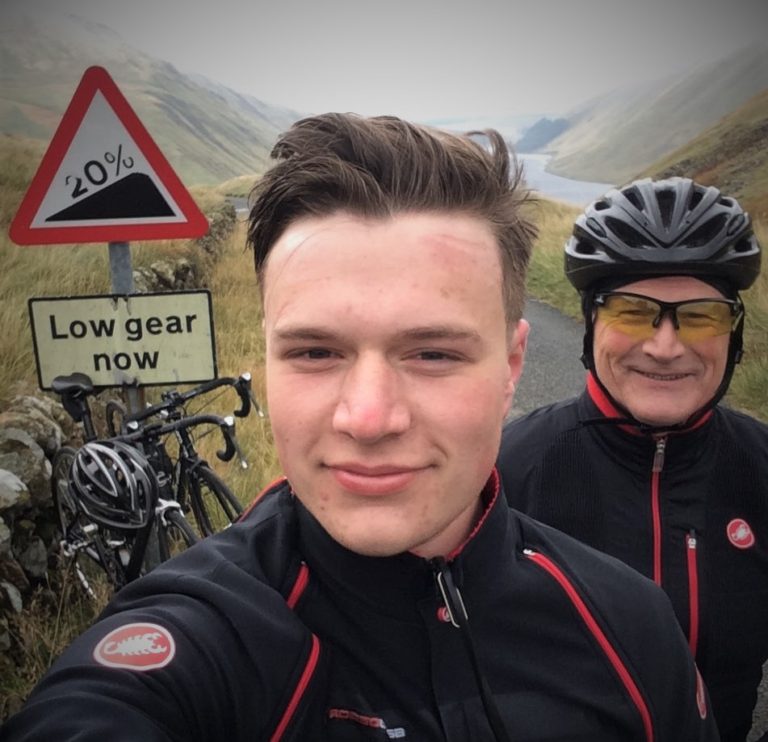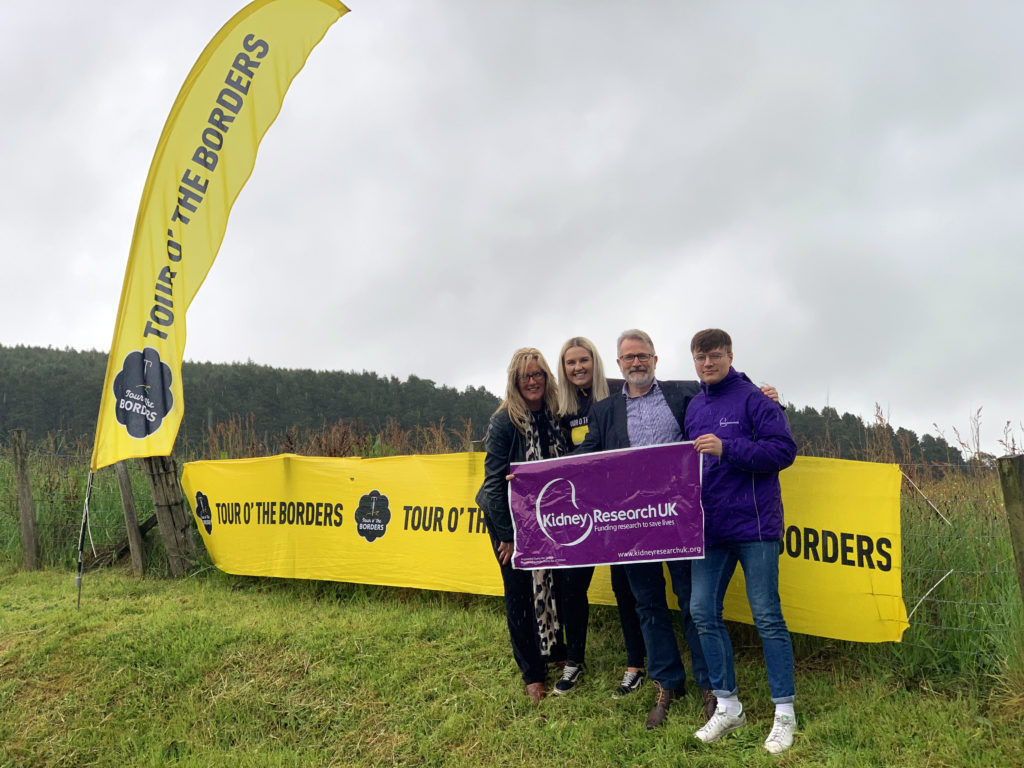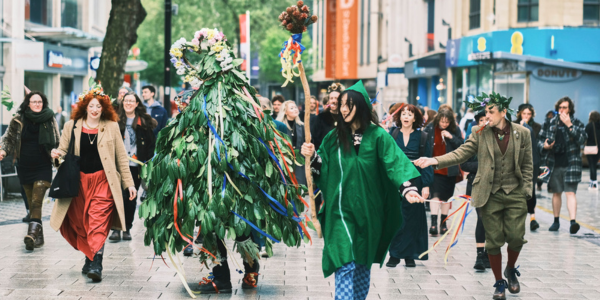
A father who donated his kidney to his son is celebrating a return to form for both of them – by undertaking an arduous 74-mile bike ride for charity.
Tim McLean, 61, and son Joseph, 22, are set to take part in the Tour O The Borders sportive cycle event on September 1 – just six months after they underwent transplant surgery.
Tim, who lives near Biggar, South Lanarkshire, said he wants to raise awareness of kidney health after Joseph’s rapid deterioration in July last year.
“Joseph had been feeling a little bit off for a couple of months,” said Tim, a Clinical Trial Consultant, who works in Huntington’s Disease. “He had been complaining of muscle cramps and drinking gallons of water; we had been out on a few long-distance bike rides together and I’d noticed he had been struggling to keep up throughout, working harder than he might have had to before.”
The father-of-three said that it had struck him as unusual because Joseph was an extremely athletic young man; he is a sports science student at Robert Gordon University in Aberdeen, works out in the gym regularly, played shinty for the university team and does a lot of long-distance cycling. “I thought at first my fitness had improved but it’s obvious now that it was his performance that was impaired,” he adds.
Over the summer term break last year, Joseph had worked at a holiday activity club as a lifeguard but during the hot weather he was feeling excessively tired and listless and in need of a lot of hydration, drinking large amounts of water each day.
Joseph visited his GP, who advised that he take on board more electrolytes (salts and minerals crucial to hydration), and booked him in to do some blood tests.
On Friday, July 13, Joseph had his bloods taken and in the afternoon had gone to play golf; Tim and family, including Joseph, had gone out to dinner that evening, and only on their return home at around 10.30pm did they find a series of answer machine messages from the health centre, then a nurse, a doctor and finally the out-of-hours service, who had all been trying to call Joseph. On hearing the messages they called back the out-of hours-service and were dramatically informed that Joseph had some ‘unusual results’ from his blood tests and should go to the nearest A&E as soon as possible.
Tim and his wife Amanda travelled with their son immediately to Wishaw General Hospital, where they performed further urgent blood tests and confirmed that he had dangerously high potassium levels putting him at risk of cardiac arrest and that his haemoglobin levels – the protein that carries oxygen in the blood – were alarmingly low.
He was fast-tracked to the cardiac unit to stabilise his potassium levels and the following day Joseph was transferred by blue-light ambulance to the renal unit at Monklands Hospital where he was diagnosed with ‘end stage kidney failure’, as he had less than 10% kidney function.
Joseph immediately commenced life-saving haemodialysis, a process of artificially filtering the blood to remove the waste and excess liquid, which all patients with end-stage kidney failure require in order to stay alive. Due to the urgency of this treatment, he required a relatively high-risk procedure to fit a plastic tube ‘cannula’ into his groin. This allowed the regular access to his blood system required for repeated haemodialysis sessions over the next two weeks in hospital while the clinicians stabilised his blood levels.
Upon discharge from hospital Joseph commenced a regimen of four hours haemodialysis three times per week that was to be his routine for the foreseeable future. The sessions were performed at the Dialysis Department of Monklands Hospital, requiring a two-hour return journey by car from his home near Biggar, usually setting off at around 6.30am and often resulting in a feeling of exhaustion during at least the following afternoon.
Two-and-a-half weeks into this routine and Joseph woke up one morning feeling ‘quite unwell’; he was advised to visit his GP who immediately referred him back to the renal ward at Monklands Hospital where he was diagnosed with sepsis, a potentially life-threatening blood infection, which originated from the cannula and had to be treated by strong antibiotics.

Fortunately, the infection was treated immediately, the cannula removed from his groin and a new one inserted into his shoulder. Due to the risk of infection of any cannula being inserted, this too was eventually removed following the preparation of a fistula in his left forearm (a surgical procedure whereby the radial artery is linked directly to the vein causing it to expand and enable easier repeated insertion of the dialysis needles for long-term regular dialysis sessions). By the end of August Joseph was discharged home once again and returned to relative health and the three times weekly dialysis routine, although the diagnosis for the underlying kidney condition was still to be made.
At first doctors thought it might be an auto-immune condition causing the problems. The family had to wait up to 12 weeks for the results of diagnostic tests, which came back negative. In the meantime, Joseph travelled back to Aberdeen to resume his studies and continued to attend regular three times weekly haemodialysis sessions in order to filter his blood. The consultant at Aberdeen Royal Infirmary had spoken to Joseph’s mother, Amanda, who revealed that she had had some kidney issues for some years, albeit very different and ‘mild’ in nature.
The theory they started to move towards was that Joseph could be suffering from a very rare hereditary condition called Alport Syndrome; Tim said the family had noticed that Joseph’s hearing (hearing loss is one of the symptoms of Alport Syndrome) had not been great, but had put it down to a selective hearing bias some might associate with young people. The results of that particular test were eventually confirmed in early November.
Life on haemodialysis required many dietary constraints including avoiding foods high in potassium and calcium and moderating his protein intake. This excludes a surprising array of nutritious foods that would otherwise be viewed as healthy options for people with normally functioning kidneys. Worst of all, chocolate was definitely ruled out. He also had to carefully balance the fluid intake required to remain sufficiently hydrated during exercise but to avoid taking on too much fluid and overburden the dialysis procedure.
However, rather than thinking, ‘is this the future for me?’, Tim said his son’s nature was always to ‘find the silver lining’. He was determined that the condition would not get the better of him and in the knowledge that it would greatly improve his quality of life, he had resumed exercise, albeit at a lower intensity and being careful not to overdo it, and not to drink too much liquid, which would interfere with the haemodialysis.
“I think the Renal department were used to people doing less activity, not getting back on a bike and belting up hills,” said Tim. But Joseph did have to give up playing shinty because of the physically demanding nature of this contact sport, including the risk that he may damage the fistula in his forearm. “It was a great shame as there was a really good camaraderie in the team and he enjoyed the social side to it,” Tim added.
Over the winter months Joseph combined his studies with haemodialysis and bike rides. He had also managed to secure a work placement with Scottish Cycling at the Sir Chris Hoy Velodrome in Glasgow, which had been a “great experience”. One of the upsides of the haemodialysis in Aberdeen, Tim added, was that Joseph’s sessions were evening-based, enabling him to attend all of his classes and to devote this time to his studies. “He ended up getting his best grades ever,” said Tim. “He spent much of his time, three times per week on dialysis doing coursework, and it provided great structure.”
In addition, Tim said Joseph had been told at the outset that he would most likely, at some stage, need a kidney transplant. By necessity of an urgently required blood transfusion, this “somewhat shocking information” had to be delivered on the day of his diagnosis of kidney failure. The good news that Joseph managed to filter out of this message was that being young and healthy, he was potentially a good candidate for kidney transplant should a suitable donor be found.
The “first thing that came to mind” when Tim heard the word ‘transplant’ was, “Could I possibly be the donor?” It turned out he was a reasonably good match, and with the same blood group there was a guarantee of at least a 50% chance of match tissue typing. Tim underwent extensive medical history checks. His main concern was that given his age, that he may not be the best candidate to donate to his son.
However the transplant team confirmed that given his good general health – he had had no major illnesses, had only ever been under a general anaesthetic once, to have a tooth removed, and had never been to hospital – and that he had maintained a reasonably good exercise regime himself (and Amanda had cut salt from the family diet around ten years earlier), he was deemed to be a good candidate.
This was despite the fact, also, that there is a national kidney pairing programme – matching potential donors and recipients – on a database administered by the NHS Blood and Transplant authority. Nevertheless he was still considered to be the best option for Joseph. Tim was more determined than ever for himself to be the donor for his son and the last remaining hurdle was for him to convince the Human Tissue Authority that he was of ‘sound mind’, was not being paid for his kidney, nor was he being psychologically coerced into donating.
The operation was carried out successfully in late February this year, and Tim was discharged from hospital within three days, and back at work in six weeks. Fortunately, there is no effect of having one less kidney as the human body can function just as well as with two. “That’s why we have two kidneys – so we can donate the other one,” Tim jokes. This has been reflected in campaigns like “Share your spare”, which kidney transplant charities have promoted.
As for his treatment within an often-criticised NHS, Tim adds: “I cannot fault my experience of the NHS; you hear stories of the NHS in crisis but I’ve not witnessed that. When you get to the people you need to, they are all absolutely superb. Many are obviously overworked but the level of care was outstanding and it was a great privilege associating myself with the Edinburgh Royal Infirmary transplant team. Any parent would jump at the opportunity to donate to their own son or daughter – there are no negatives for me – and I’ve been given this amazing opportunity. I feel blessed to have had the experience.”
Tim said that he was treated like a VIP, was given a 100% health check, and that staff could not have done more for him, initially on the high dependency unit (HDU) and then on the general renal ward, where he recovered. Joseph’s stay in hospital was slightly longer than Tim’s. Whilst he received his new kidney within a couple of hours of it being removed from his father – and in fact was back on his feet before him – the transplanted kidney’s performance was very carefully monitored as he commenced a delicately measured course of imuno-suppressant medication.
Nevertheless, he too was discharged home within only 10 days once he had familiarised himself with a ‘spectacular’ range of 11 different medicines that he has been required to take at very specific times of day. Both Tim and Joseph have since been back in training but not initially on the road during the spring; instead they started preparing for Tour O The Borders, powered by Pirelli, on their ‘interactive turbo trainers’, which are static bikes they use at home with online virtual modes. Joseph had been advised to go on long walks after the transplant but Tim said his son was determined that he wouldn’t just settle for that.
Joesph does have to be cautious as the immuno-suppressant medication that he will have to take for the duration he has his father’s kidney means he is susceptible to infection. An unwelcome reminder of this occurred when Tim returned from a work trip in the US with a cold, he passed it on to Joseph and it took him weeks to shake it off. However, that has not stopped the pair and they are ‘gradually building up’ to being match fit for the sportive, which starts and finishes in Peebles and includes the famous Talla Wall climb.
“There are a few fairly steep climbs, one of which has a 20% gradient; we want to attempt them in training but we are a bit behind schedule,” says Tim. “But it is superb road biking country; it’s stunningly beautiful.”
He added: “I genuinely believe participating in events like this kept me in the shape that I am. And Joseph was at such a high level of fitness, much fitter than the average person before his diagnosis.”
In the run-up to the sportive, Joseph has attended regular check-ups at the Edinburgh Royal Infirmary Renal Unit and has received advice from Peebles and Edinburgh-based physiotherapist Phil Mack on how to prepare and not, crucially, ‘push himself too hard’.
On hearing their story, the organisers of Tour O The Borders – Hillside Outside Ltd – decided to designate Kidney Research UK as their official charity this year. For Tim, whose JustGiving page is here, the opportunity is to raise much-needed awareness of kidney health, but also the importance of maintaining a healthy diet and physically active routine. He also paid tribute to the organisers for giving them a complete refund – on hearing their story – in order to have a second chance to complete the event.
“We’re extremely grateful for the opportunity to come back and do this wonderful event,” he says. “It’s nothing but fantastic.”
He added: “We look forward to meeting up with many old and new friends and a great day of cycling on 1 September and hopefully raise some money for this very worthy cause.”
Hillside Outside said it was committed to demonstrating the ‘many benefits of cycling’ and after hearing the father and son’s inspiring story that it was proud to have struck a partnership with Kidney Research UK.
Harley Lothian, Hillside Outside Marketing Manager, said: “Tim and Joseph reached out to us earlier this year and we were so inspired by their story that we wanted to do what we could to raise awareness of this fantastic charity and ultimately educate people on the benefits that being physically fit can have in such a situation. We are delighted to announce this partnership with Kidney Research UK and hope to work together to help many more families across the UK.”
To donate to Tim and Joseph’s JustGiving Page visit the link here and for information about the event visit the Tour O The Borders web page. For information on Kidney Research UK visit here.

![LNER partners with children's charity to create magical memories as it marks its Big Wheel launch LNER[2]](https://eventsbase.co.uk/wp-content/uploads/2024/12/LNER2.png)


